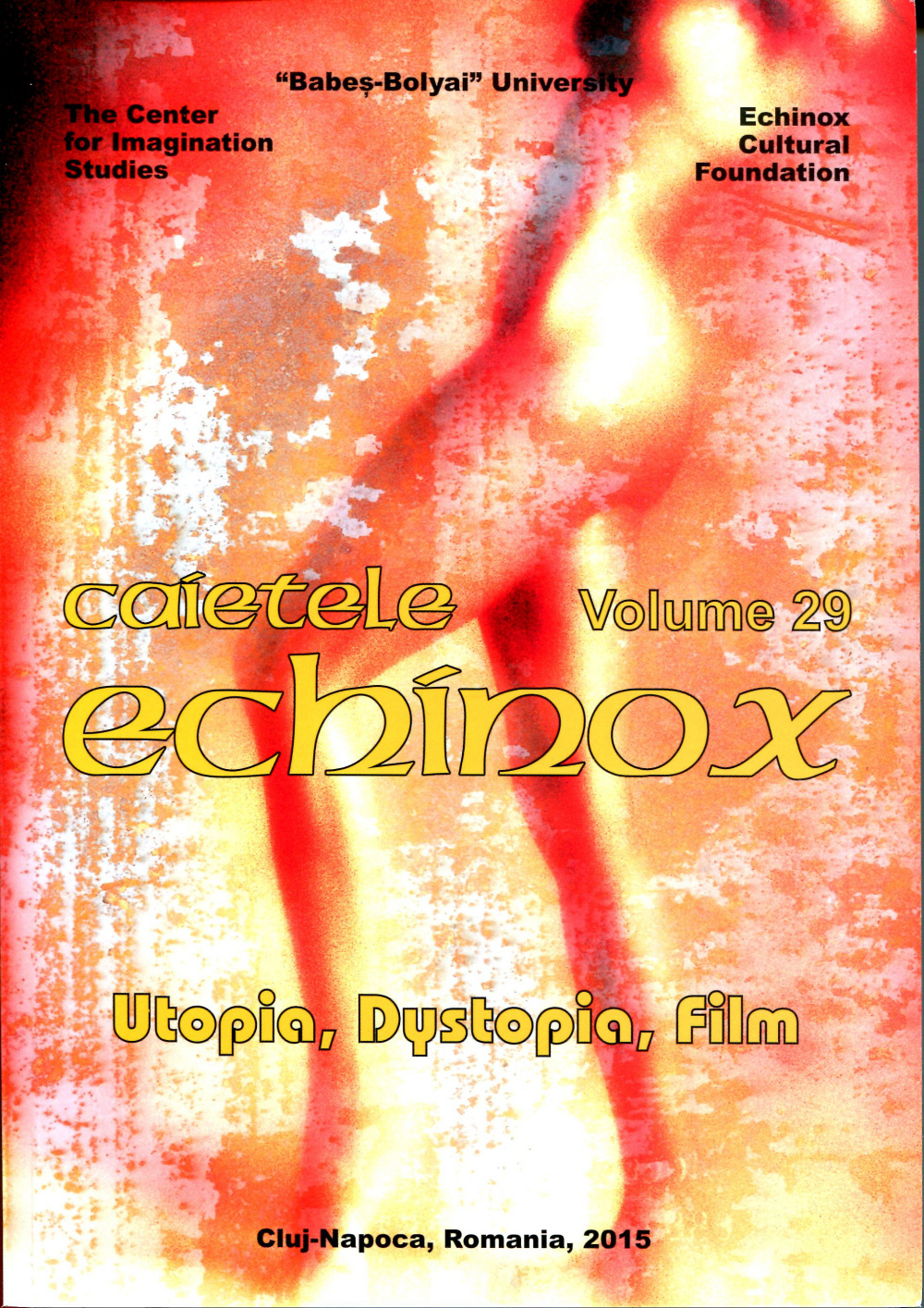Radu Toderici, Utopia, Dystopia, Film. An Introduction
Cinema as a Cultural Phenomenon
Miruna Runcan, " The Body of the Empathic Spectator " ;
Cristian Rusu, " Abstract Cinema and Aesthetic Utopia in the Interwar Period " ;
Calin Stegerean, " With the Avant-Garde to the Cinema " ;
Alexandra Noemina Radut, " The Nudity of the Visage. Ingmar Bergman and Persona ".
Generic Affinities: From Science Fiction Cinema to Political Filmmaking
Andrei Lazar, " Hervé Guibert spectateur-photographe de La Jetée de Chris Marker " ;
Andrada Fatu-Tutoveanu, " Far and Away: Utopian Projections, Mythological Quest and the American Dream in Kazan's America America " ;
Cristian Pascalau, " The Death of Individual Freedom and Its Mass Effects over the Young Generation in Roberto Faenza's H2S " ;
Cosmin Perta, " Melting Reality, Rising Utopia, or Why You Should Never Come Back to Reality " ;
Ioan Pop-Curseu, " De l'utopie sur grand écran: Jean-Jacques Rousseau et le cinéma " ;
Dana Bizuleanu, " Teaching Dystopia: The Wave (1981). A Classroom Experiment " ;
Laurentiu Malomfalean, " Les machines à rêver dans le cinéma hypermoderne " ;
Luiza-Maria Filimon, " "Beware the Cosmic String, My Son": Highjacked Realities and Accidental Utopias in Shinichiro Watanabe's Space Dandy ".
Themes and Ideologies
Doru Pop, " Mad Max – Spare-Parts Heroes, Recycled Narratives, Reused Visualities and Recuperated Histories " ;
Adriana Carrijo & Marilena Jamur, " Une cartographie des désirs utopiques – Observations sur le film Mad Max: Fury Road " ;
Olga Stefan, " Identity Dissolutions in the Context of the Reality-Dream-Hyperreality Relationship in Vanilla Sky, Truman Show and The Matrix " ;
Carmen-Veronica Borbély, " Body Drift: On the Precariousness of Posthuman Life in Never Let Me Go " ;
Marius Conkan, " From Fantasy Fiction to Film: The Chronicles of Narnia as Religious Spaces " ;
Petronia Popa Petrar, " The Resurrected Future of Cloud Atlas: Writing and Filming Dystopian Time " ;
Corin Braga, " Antiutopies critiques post-apocalyptiques " ;
Stefan Borbély, " The Divergent Series & The Giver: A Stroll into the Post-Geometric World " ;
Theodora-Eva Örmény, " Phenomenological Insights into Cinematographic Dystopia as It Unfolds in the Productions Divergent and Insurgent " ;
Andrei Simut, " The Post-Human Utopian Paradise and the Impossible Gaze from Philip K. Dick to Spike Jonze's Her " ;
Stefan Bolea, " The Phantasm of Revolution from Fight Club to Mr. Robot " ;
Francisc Ormeny, " Digging out the Heideggerian Linguistic Utopia from Bryan Fuller's and Mads Mikkelsen's Hannibal (Seasons 1 & 2) ".
National Cinemas, Auteur Dystopias
Eduardo Portanova Barros, " Ruy Guerra et Dionysos ou la contre-utopie de l'imaginaire de l'auteur au cinéma: racines de l'éthéré " ;
Ruxandra Cesereanu, " Dystopian Reminiscences in the Romanian Contemporary Film (Miserabilist Stances in the Films of Mircea Daneliuc, Lucian Pintilie and Cristi Puiu) " ;
Laura T. Ilea, " Soumission ou capitulation? Une France antiutopique dans le roman Soumission et dans le film L'enlèvement de Michel Houellebecq " ;
Cristina Vidrutiu, " The Blind Spot. Utopian and Dystopian Seeds in José Saramago's Novel Blindness " ;
Anca Ursa, " Dystopia, Bureaucracy and Identity in Crulic – The Path to Beyond ".

